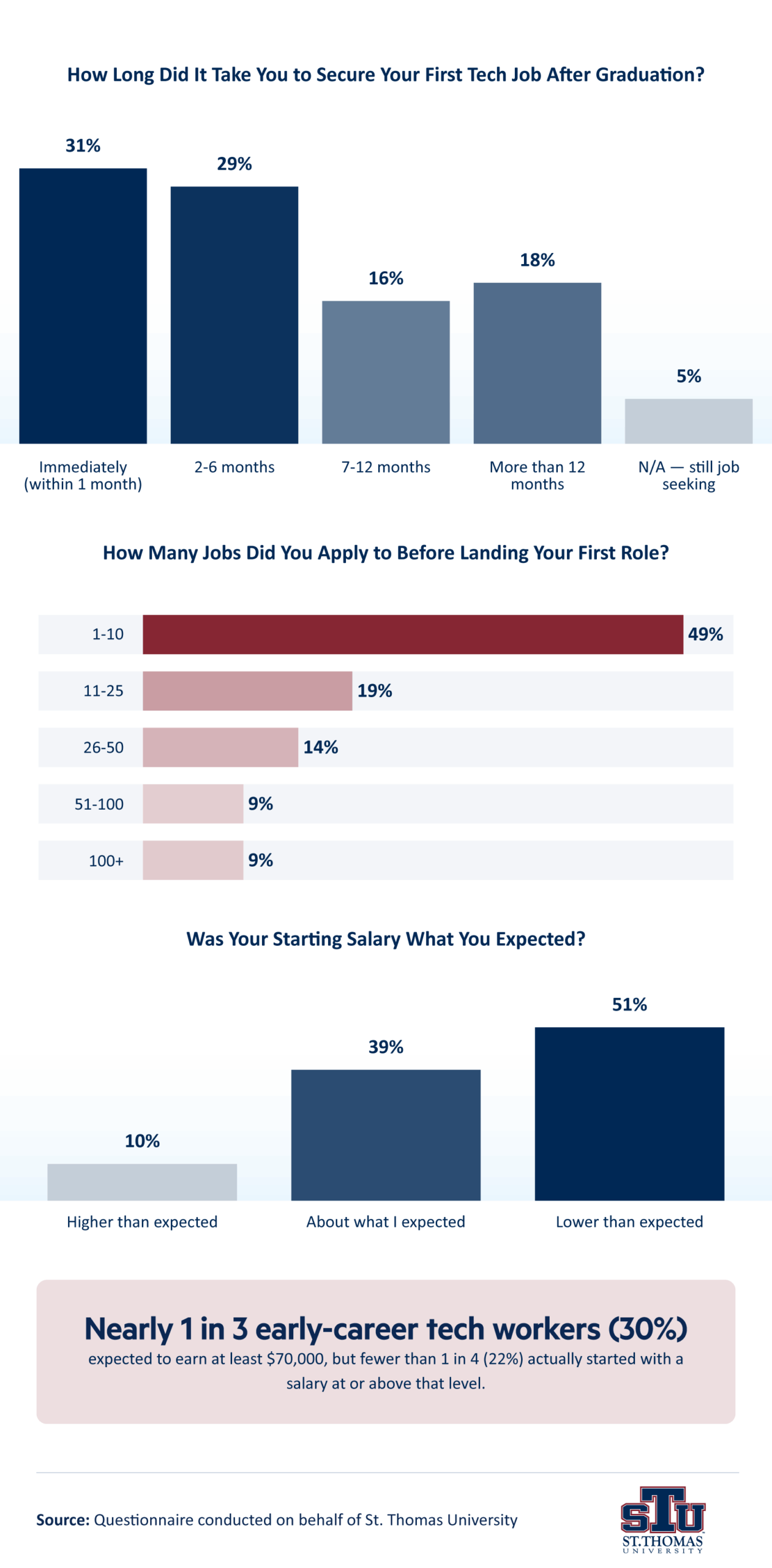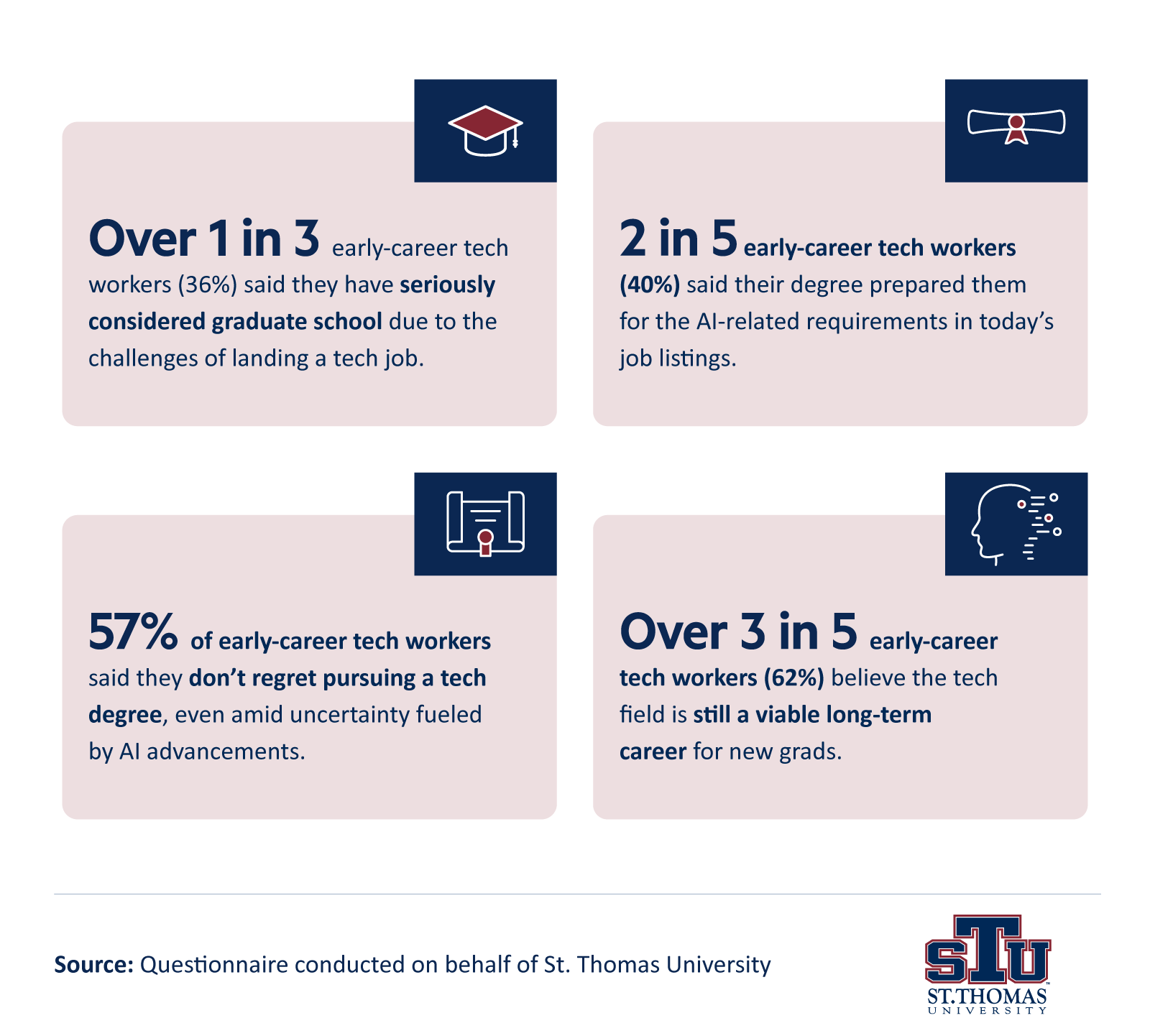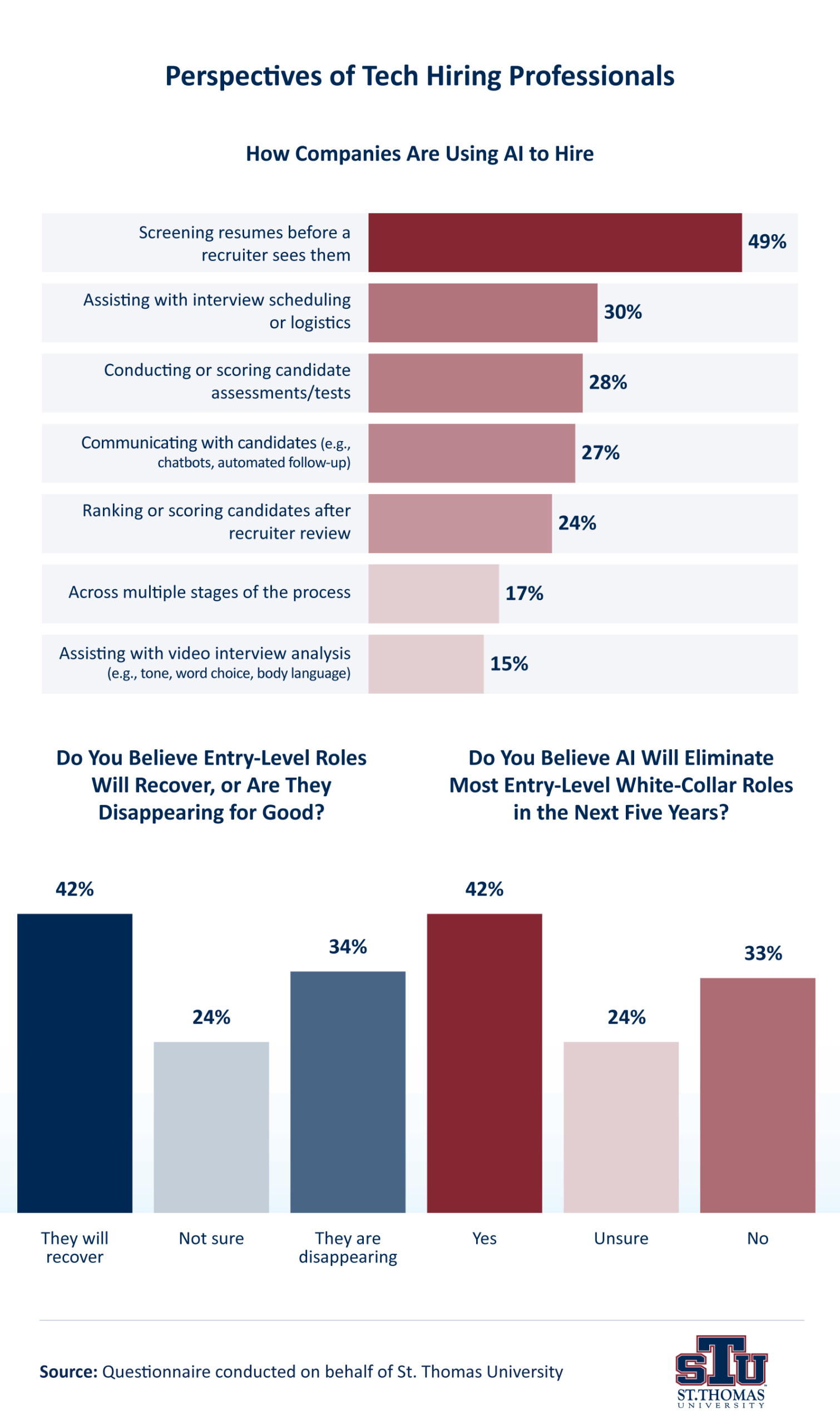
Artificial intelligence is rapidly changing the job market, but its impact on technology hiring is especially significant. As automation and AI tools transform recruitment processes, many graduates entering the field face new challenges when seeking their first role. To better understand these shifts, a questionnaire conducted on behalf of St. Thomas University (STU) gathered insights from both early-career tech workers and hiring professionals.
STU commissioned this research to explore how AI is influencing entry-level opportunities and to better understand the perspectives of both job seekers and employers. The findings explore how graduates are navigating today’s market, how hiring managers are adapting to new tools and what these changes mean for the future of tech careers.
Key Takeaways
- Early-career tech workers applied to an average of 25 jobs before landing their first role, and nearly one in five had to apply to 50 or more.
- Two in five early-career tech workers (40%) say their degree prepared them for the AI-related requirements in today’s job listings.
- 57% of early-career tech workers say they don’t regret pursuing a tech degree, even amid uncertainty fueled by AI advancements.
- Over three in five early-career tech workers (62%) believe the tech field is still a viable long-term career for new grads.
- Nearly eight in 10 early-career tech workers (78%) say they’ve encountered “ghost jobs,” roles that appear outdated or fake or posted by employers that never respond.
- Nearly two in five hiring professionals (40%) expect their company to increase entry-level hiring in the year ahead.
Job Hunting in a Competitive Market
Finding a first role in tech has become a lengthy and competitive process for many new graduates. With AI reshaping both job descriptions and the hiring funnel, early-career professionals often find themselves applying to dozens of openings before securing employment.

On average, early-career tech workers applied to 25 positions before landing their first job. Most often, candidates had applied to one to 10 open roles (49%), but 18% had to submit over 50 applications to get hired. Only 21% of job applications led to a real human interview. Nearly three in four job seekers (73%) believed AI resume filters prevented their applications from being seen.
Seventy-five percent of early-career tech workers agreed that some companies left postings up just to collect resumes, further fueling feelings of wasted effort. Another 78% reported encountering “ghost jobs,” roles that appeared active but never generated responses.
Despite the prevalence of AI-driven barriers in the application process, 53% did not believe their lack of AI skills directly harmed their job prospects. Just 5% of workers said they were unemployed, and they have continued to search diligently for their first tech job. On average, they had applied to 16 roles in the past three months and dedicated about five hours per week to the process.
Education and AI Readiness
As AI adoption accelerates, the role of formal education in preparing students for workforce demands has come into focus. While tech degrees remain valuable, their alignment with rapidly evolving requirements is mixed.

A majority of early-career tech workers expressed confidence in their academic choices, with 57% saying they did not regret pursuing a tech degree. Forty percent also reported that their degree equipped them with the AI-related skills now commonly seen in job postings. Over three in five believed the tech field remains a promising long-term career path for college graduates.
Still, graduates acknowledged the difficulties of today’s market. More than one in three (36%) said they had seriously considered graduate school due to job search challenges. Over half (55%) had considered applying outside the tech sector, and one in four were already submitting applications for non-tech roles. Nearly half (46%) reported that the job market had negatively affected their mental health, and two in five said their sense of self-worth had suffered as well.
When considering alternative career paths, finance and banking (28%), creative or media industries (24%), consulting (21%), and healthcare (21%) emerged as the most appealing options. Retail and e-commerce also attracted interest from 15% of respondents. Interestingly, nearly half of early-career professionals (48%) said they had never exaggerated AI skills on a resume, suggesting a desire to remain honest even in a competitive environment.
Employer Views on Entry-level Roles
Employers also face the challenge of balancing immediate workforce needs with long-term talent development. AI tools are transforming how companies screen and evaluate applicants, and hiring managers are adapting to these new practices while weighing the future of entry-level roles.

Nearly half of hiring professionals reported using AI to screen resumes before a recruiter ever sees them, and 28% said AI helps schedule interviews or assess candidates through tests. Other applications include chatbots for communication, ranking candidates after recruiter review and even analyzing video interviews. These tools demonstrate how integrated AI has become in shaping the first stages of recruitment.
Despite these shifts, opportunities for graduates are not disappearing. Nearly two in five hiring professionals expect to increase entry-level hiring in the year ahead. Over the past year, 38% said entry-level hiring stayed the same, and 29% reported growth. More than half of companies (53%) had not changed minimum experience requirements, and only 18% required AI-specific skills for most postings. In addition, 58% said their organizations had no ghost job listings.
Looking to the future, hiring professionals were divided. Forty-two percent believed entry-level roles would recover after the initial AI boom, while 34% thought they were disappearing for good. A similar share, 42%, agreed that AI may eliminate most entry-level white-collar roles in the next five years. One-third didn’t think that could happen, and 24% were unsure, showing the uncertainty surrounding the impact of automation on early-career opportunities.
The Future of Tech Hiring
Early-career tech workers are facing a challenging but not insurmountable path into the industry. Graduates are applying to numerous jobs, often encountering ghost listings, yet many still see value in their degrees and believe in the long-term potential of tech careers. On the employer side, cautious optimism about entry-level hiring suggests opportunities remain, even as AI-driven processes change recruitment tactics. These findings illustrate a complex but evolving hiring environment that future graduates must be prepared to navigate.
Methodology
A questionnaire of 450 early-career American tech workers and 170 American hiring professionals in tech was conducted on behalf of STU to investigate how AI’s rapid integration is disrupting the entry-level tech job market from both sides of the hiring equation. Respondents were sourced using CloudResearch Connect. Among tech professionals, the average age of respondents was 33; 32% were women, 65% were men and 3% were non-binary. Among hiring professionals, the average age of respondents was 42; 35% were women, 64% were men and 1% were non-binary. Due to rounding, some percentages may not total exactly 100%.
This is a non-scientific, exploratory questionnaire designed to explore behavioral and attitudinal trends. It is not intended to represent all job seekers or employers.
About St. Thomas University
St. Thomas University offers degree programs designed for students who want the flexibility to learn from anywhere while advancing their careers. STU’s online MBA programs help students develop advanced business skills, connect with faculty and peers virtually and balance their education with work and personal commitments.
Fair Use Statement
This content is for educational and noncommercial use only. If you share or reference this article, please link back to St. Thomas University and provide proper attribution.